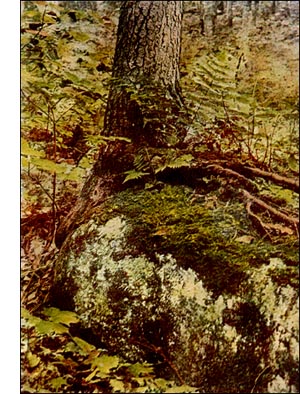Genus Polytrichum
 Genus POLYTRICHUM, Linn.
Genus POLYTRICHUM, Linn.Found in extensive patches by roadsides and in open woods. Brown and unattractive when dry, fresh and luxuriantly green when moist, owing to the habit of inrolling the thin margins of the leaves and folding them against the stem in dry air and of unrolling and turning them at right angles to the stem in damp air.
The Genus Polytrichum contains plants which were the first to be recognised as "plants with out flowers." Pliny called them "golden maiden-hair." They were dedicated to Venus and afterward to the Virgin Mary. Because of this fancied resemblance of the veils to a maiden's tresses, they were used to make a wash which was supposed to strengthen the hair.
The plants are very tall, 1 to 18 inches high, and live on year after year, growing perpendicularly from the centre of the male (antheridial) flower-heads or from horizontal underground stems, or from the side of main stems. The stems are stout, with almost woody fibres running up through them.
The leaves are long and slender, with a lanceshaped, awned apex and a membranous sheathing base; the vein is broad and covered by numerous thin green blades (lamellae), and the Margins are entire or serrate, often inrolled.
The generic name Polytrichum is composed of two Greek words for; many, and; a hair, and refers to the large mitrate, hairy veil which may partially or entirely cover the spore-case.
The spore-cases are erect or horizontal with 4 to 6 angles, a distinct basal portion (apophysis, see page 57), and lids conical or flattened-convex with a point at the centre.
The peristome is single, of 64 short, rigid teeth united at the base and joined above to a thin circular disk (epiphragm) which terminates a central column.
The spores small and smooth.
There are ninety-nine species in all, about fifteen of them known in North America.
Awned Hairy Cap Moss
Common Hairy Cap Moss
Juniper Hairy Cap Moss
Ohio Hairy Cap Moss
Slender Hairy Cap Moss